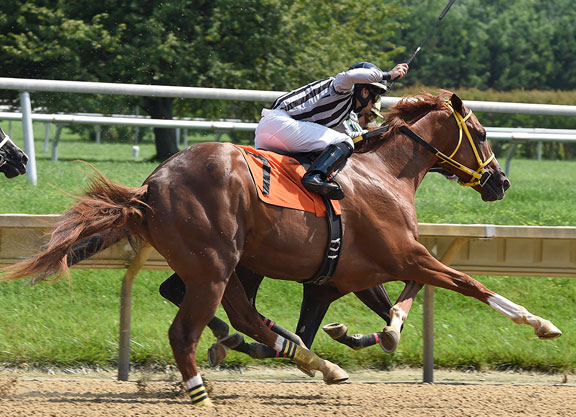By T. D. Thornton
In an attempt to get a revised whip violations penalty scheme on the books before Del Mar hosts the Nov. 5-6 Breeders' Cup, the California Horse Racing Board (CHRB) Wednesday advanced a rule amendment that mostly has the blessing of The Jockeys' Guild because it strips out a previously controversial proposal that would have docked jockeys 50% of purse earnings if they over-whipped while finishing first, second or third in graded stakes.
That purse penalization had been proposed by the CHRB in March in an attempt to disincentivize riders from disregarding the number of times and manner in which a Thoroughbred can be struck with the whip, particularly if the jockey believed the reward of winning a multi-million-dollar stakes far outweighed the cost of incurring a comparatively smaller fine or suspension.
When the Guild and other stakeholders argued last month that going after purse money was too harsh, the CHRB voted 4-3 to table the measure and revise it. The new version that the board voted 6-0 on Apr. 21 essentially is the same proposal, except with the purse penalization removed from the new language of Rule 1688.
Left intact from last month's version was an amendment to change the maximum fine of $1,000 and a minimum suspension of three days to a minimum fine of $500, or, if determined by the stewards to be an egregious or intentional violation, a larger fine, a minimum suspension of three days, or both. That is the meat of the measure that now advances to California's mandatory 45-day public comment period before it will come back to the CHRB for a final vote.
Based on testimony delivered Wednesday by Shane Gusman, an attorney representing the Jockeys' Guild, the riders aren't likely to challenge the proposal before its expected adoption.
Gusman thanked the CHRB for addressing concerns that he aired on behalf of the Guild back in March. “We certainly appreciate the clear linking of the most egregious conduct with the significant, or higher, penalties, and the elimination of the 50% purse forfeiture provision,” he said. “Those were pretty large concerns of the folks in the Guild in California.”
Gusman did say that parts of the penalty scheme do “remain concerning,” including there now being no cap on the maximum fine. He said that creates a concern that “someone could get a fine that's out of whack” in relation to the infraction, and he asked the board to monitor the wide discretion that stewards will be given once the new version of the rule gets officially enacted.
Gregory Ferraro, DVM, the CHRB's chair, reminded Gusman that jockeys always have the avenue of appealing stewards' fines to the full board if they believe they're not fair, adding that, “I think your worries there are probably not significant.”
At the March meeting, CHRB Vice Chair Oscar Gonzales had said that “this rule is [about] making sure that the upcoming Breeders' Cup goes off [more] smoothly than anything else.” He articulated a concern that the combination of two days of Grade I stakes and too weak a penalty scheme would create “a wild west type of a situation” in which jockeys openly flouted the six-strike, underhand-only, no-more-than-two-hits-in succession rule in order to cash in on a lucrative and prestigious payday.
Scott Chaney, the CHRB's executive director, noted that it is standard for the stewards to hold daily briefings with visiting riders from other parts of the country and from overseas during the Breeders' Cup week, and that this year the stewards will be tasked with making sure no rider can say he or she wasn't aware of the whipping protocols and the penalties for violation.
“I think this protects the domestic rider,” Ferraro said with respect to the Breeders' Cup. “Our concern had been that riders, particularly from foreign countries, could violate the rule, and a $500 fine and three-day suspension would be meaningless to them. This allows for considerably more punishment for egregious violations and it's increasingly fair to our domestic rider colony.”
But the Breeders' Cup is only two days a year every several years in California. Chaney, a former steward, explained how the new proposed rule will also affect everyday riding.
“The idea is that it standardizes penalties throughout the state,” Chaney said. “Based on existing language, it appears that we have sort of a disparate application among boards of stewards. And so to be more fair to jockeys, particularly in Northern California, it would create a minimum fine. It also delineates the cases in which stewards would deviate from that fine” for any outlandish abuse of the whip.
CHRB commissioner Alex Solis, a retired Hall of Fame jockey who had spoken out against the version of the rule that was floated last month, was absent from Wednesday's meeting and thus did not cast a vote.
Not a subscriber? Click here to sign up for the daily PDF or alerts.






